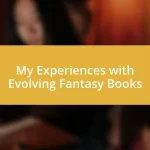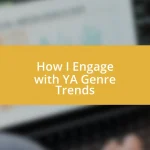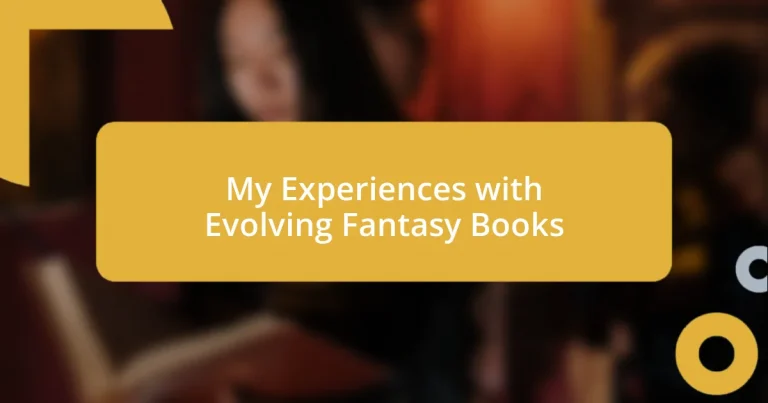Key takeaways:
- Fantasy literature evolves to blend escapism with social themes, prompting readers to reflect on identity, morality, and societal issues.
- Notable authors like N.K. Jemisin, Brandon Sanderson, and Sarah J. Maas shape modern fantasy by exploring complex characters and intricate narratives that resonate with personal experiences.
- Future trends in fantasy may include the integration of technology, a focus on mental health, and interactive storytelling formats, enhancing reader engagement and emotional connection.
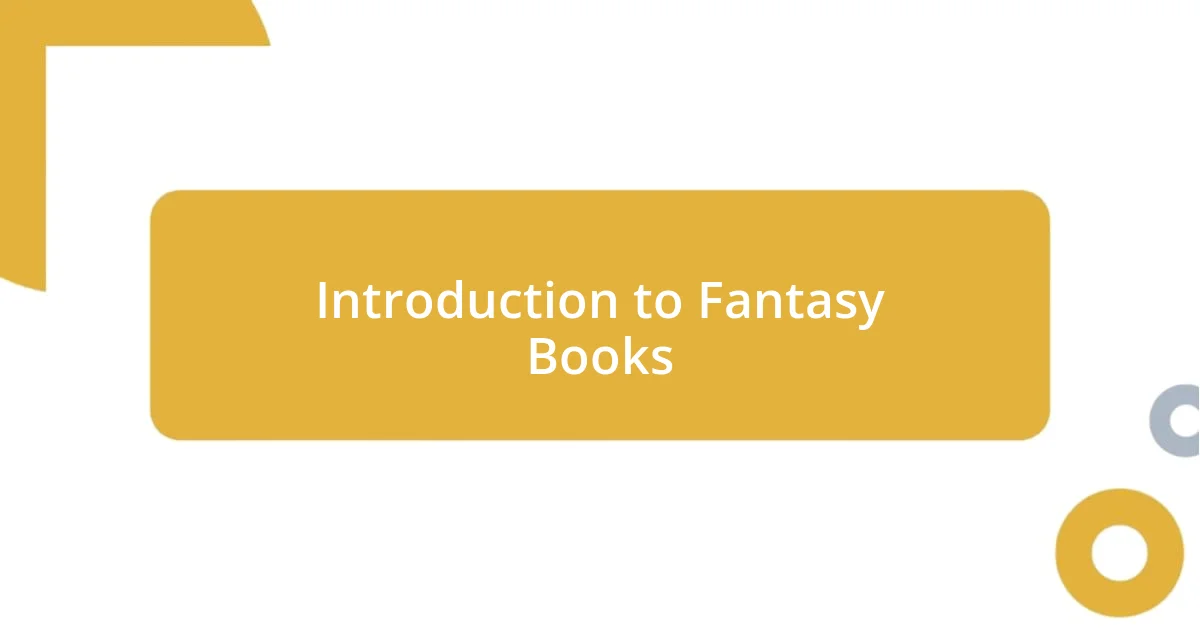
Introduction to Fantasy Books
Fantasy books transport us to worlds where the impossible becomes possible, igniting our imagination in ways that few genres can. I still recall the first time I opened a fantasy novel as a child; I was instantly swept away to a realm filled with dragons and brave heroes. Doesn’t that feeling of losing yourself in another world resonate with anyone who has stumbled upon a well-crafted tale?
As I delved deeper into the genre, I found myself captivated by the intricacies of magical systems and the complex characters that populate these enchanting landscapes. It’s fascinating how fantasy not only allows us to escape reality but also prompts us to reflect on our own lives. Have you ever noticed how a character’s journey can mirror your own struggles or aspirations?
I’ve found that what makes fantasy uniquely compelling is its ability to blend the extraordinary with universal themes like love, sacrifice, and the quest for identity. Each new book seems to unfold a fresh perspective on life, where imaginative landscapes highlight our realities in thought-provoking ways. Isn’t it incredible how a simple page can evoke profound emotions and insights?
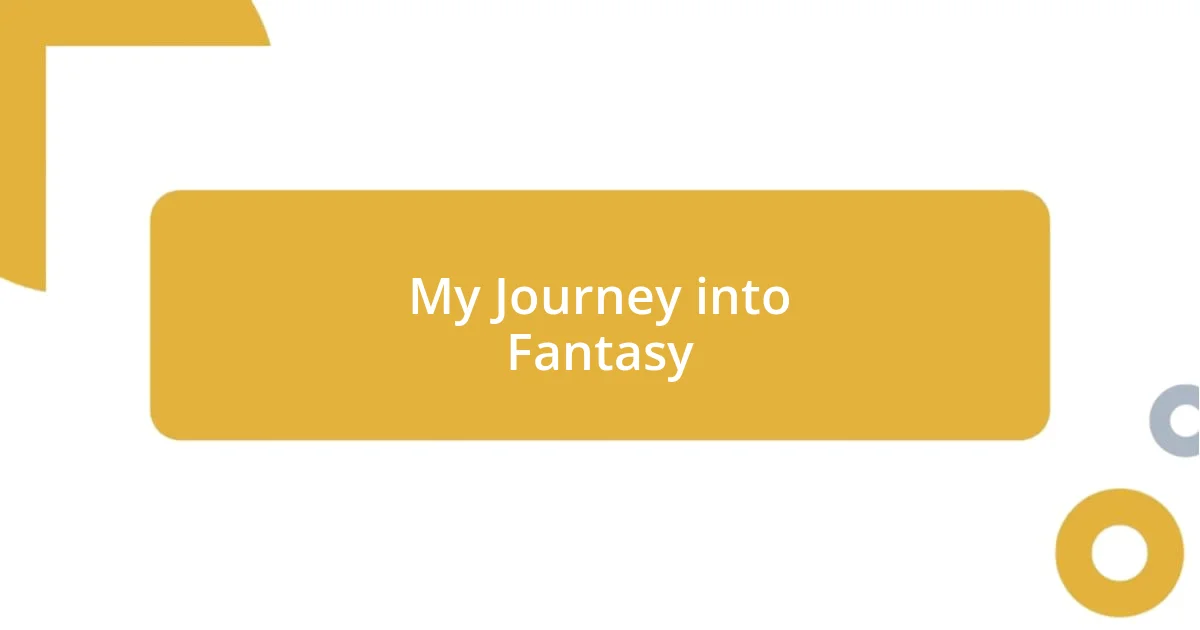
My Journey into Fantasy
My early encounters with fantasy books were like stepping through a portal to another universe. I remember reading “The Hobbit” for the first time—a book filled with marvelous creatures and epic quests. Even now, the thrill of following Bilbo’s unexpected adventure resonates deep within me. Have you ever found that one story that forever changed how you view the world?
As I grew older, my taste in fantasy evolved. I was drawn to series like “A Song of Ice and Fire” and “Mistborn,” where moral complexities and multifaceted characters kept me up late into the night. There’s something special about unraveling a narrative that challenges traditional good versus evil. It’s almost like a mirror reflecting the ambiguities of our own lives, don’t you think?
Now, I appreciate the diversity and progression within the fantasy genre itself. Authors today create expansive worlds that dive into social issues while still sparking wonder. I often find myself pondering how these shifting narratives align with modern society’s challenges. It’s practical to see that fantasy books have transformed over time, offering not just escapism but a lens through which we can examine our reality.
| Early Fantasy | Modern Fantasy |
|---|---|
| Focus on adventure and exploration | Complex characters and moral ambiguity |
| Simple magic systems | Diverse and intricate magic systems |
| Escapism and wonder | Reflection on societal themes |
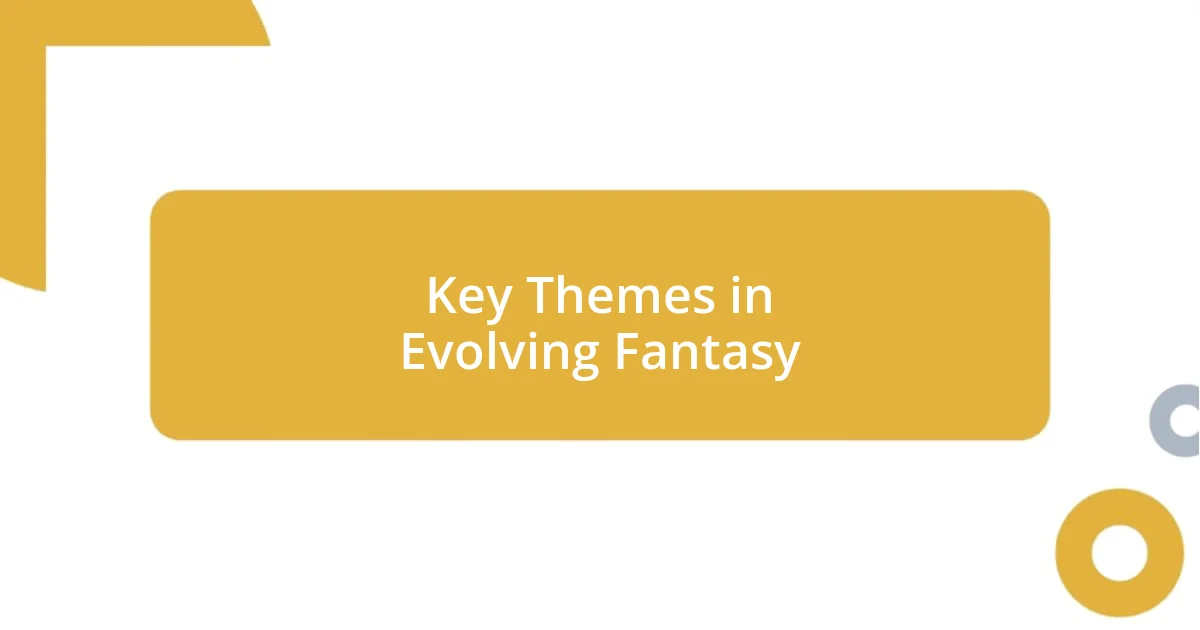
Key Themes in Evolving Fantasy
I’ve noticed that key themes in evolving fantasy often tap into broader human experiences, allowing readers to see their own lives through a fantastical lens. Love, loss, and the struggle for power aren’t just plot devices; they resonate deeply. I remember finishing a series and feeling like I had just concluded a chapter of my own life, as if those fictional characters had become friends who took pieces of my heart with them.
Some of the significant themes that stand out in this evolution include:
- Identity Quest: Characters often embark on journeys of self-discovery, mirroring our search for who we truly are.
- Redemption and Forgiveness: Themes of redemption prevail, showcasing the ability to change and seek forgiveness.
- Social Change: Modern fantasy tends to address pressing social issues like gender equality and racial diversity, prompting readers to reflect on real-life dynamics.
- Nature vs. Technology: A tug-of-war between the natural world and technological advancement highlights our contemporary struggles with environmental issues.
Such layers elevate simple escapism into meaningful storytelling, allowing readers to confront their own realities while getting lost in the pages.
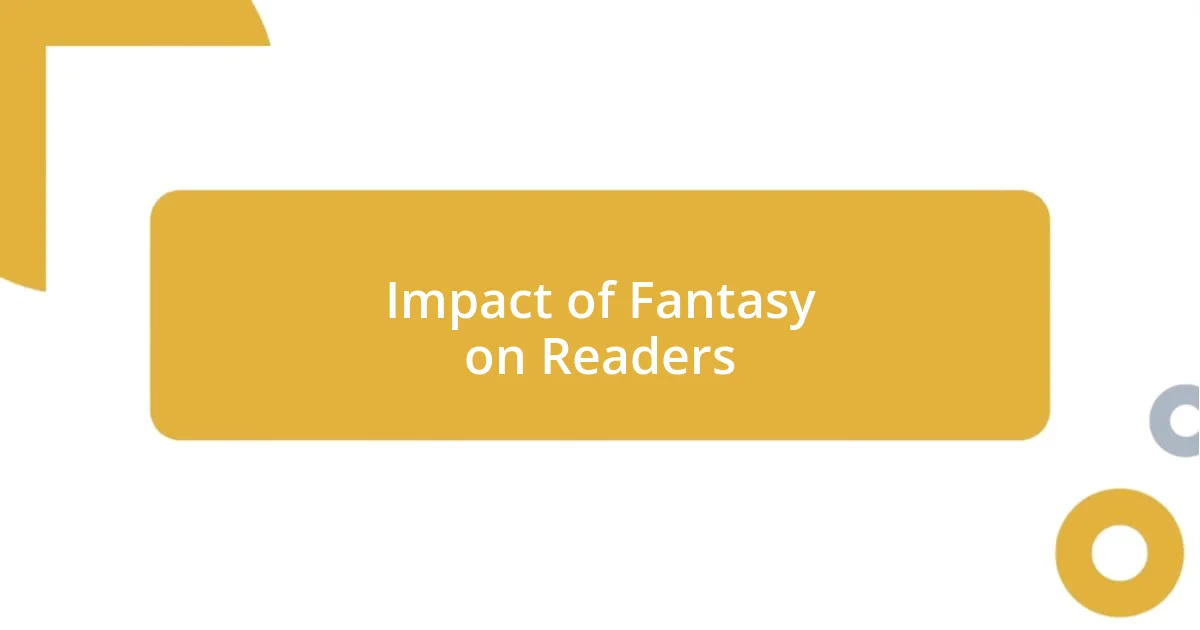
Impact of Fantasy on Readers
Fantasy books have an incredible ability to draw readers into their worlds, transforming how we perceive our own lives. I recall a time when I was deeply engrossed in “The Name of the Wind.” During those nights, I would find myself lost in Kvothe’s stories, feeling his triumphs and heartbreaks as if they were my own. It struck me how these well-crafted narratives can evoke such strong emotions and challenge perceptions, prompting us to reflect on our challenges and dreams.
I’m always fascinated by how fantasy literature can nurture empathy in its readers. For instance, when I read about characters facing prejudice or battling inner demons, it inspires me to consider different perspectives in the real world. It’s like being handed a set of glasses that helps me see beyond my own experiences. Have you ever found a character who resonated with your struggles or aspirations? I know I have, and it opened my mind to a broader understanding of humanity.
Moreover, I often think about the escapism fantasy provides. While it offers a fantastic getaway, it also mirrors societal issues, prompting crucial conversations about justice, identity, and belonging. I reflect on books, like “The Poppy War,” where the narrative explored the stark realities of war alongside vibrant fantasy elements. It left me pondering—what can we learn from these stories that we might apply to our own lives? In essence, the impact of fantasy on us is profound; it entertains, teaches, and impacts our lives in unexpected ways.
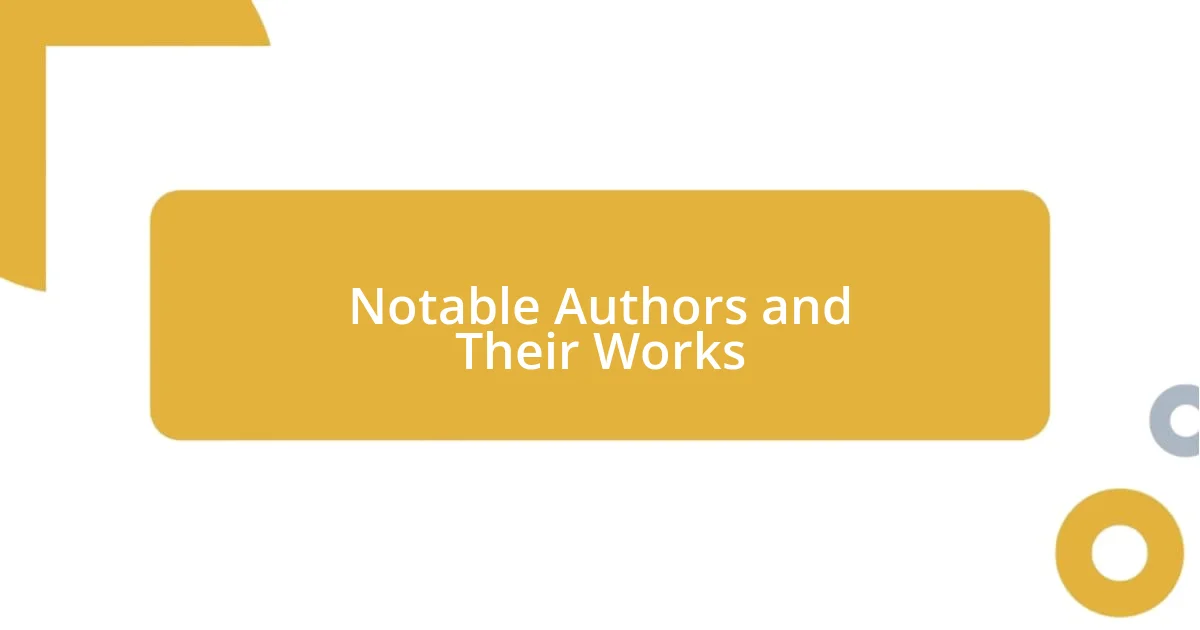
Notable Authors and Their Works
One author who has truly transformed the landscape of modern fantasy is N.K. Jemisin. Her groundbreaking series, “The Broken Earth,” challenges traditional fantasy tropes while delving into complex themes of oppression and identity. I vividly remember the moment I finished “The Fifth Season,” leaving me in awe of how she intertwined world-building with emotional depth. It made me reflect on the struggles in our world, asking if we are doing enough to break down our own societal barriers.
Then there’s Brandon Sanderson, known for his intricate magic systems and character development in series like “Mistborn” and “The Stormlight Archive.” His ability to create compelling worlds where the rules of magic are not just arbitrary but deeply tied to the plot, strikes a chord with me. I find myself often pondering the moral dilemmas faced by his characters, as they grapple with issues of power and responsibility. Have you ever imagined what it would be like to wield immense power? Sanderson’s works really make you consider the consequences of such responsibility and how it mirrors our own lives.
Lastly, I can’t overlook the impact of authors like Sarah J. Maas. With series such as “Throne of Glass” and “A Court of Thorns and Roses,” she blends romance, action, and strong female characters in a way that resonates with many readers, including myself. I can recall moments where her characters’ journeys of growth mirrored my own experiences, making me root for them as if they were friends. How often do we see ourselves in the stories we read? Maas’s writing prompts reflection on personal growth and the importance of surrounding ourselves with supportive communities, fostering a sense of belonging within and outside of fantasy literature.
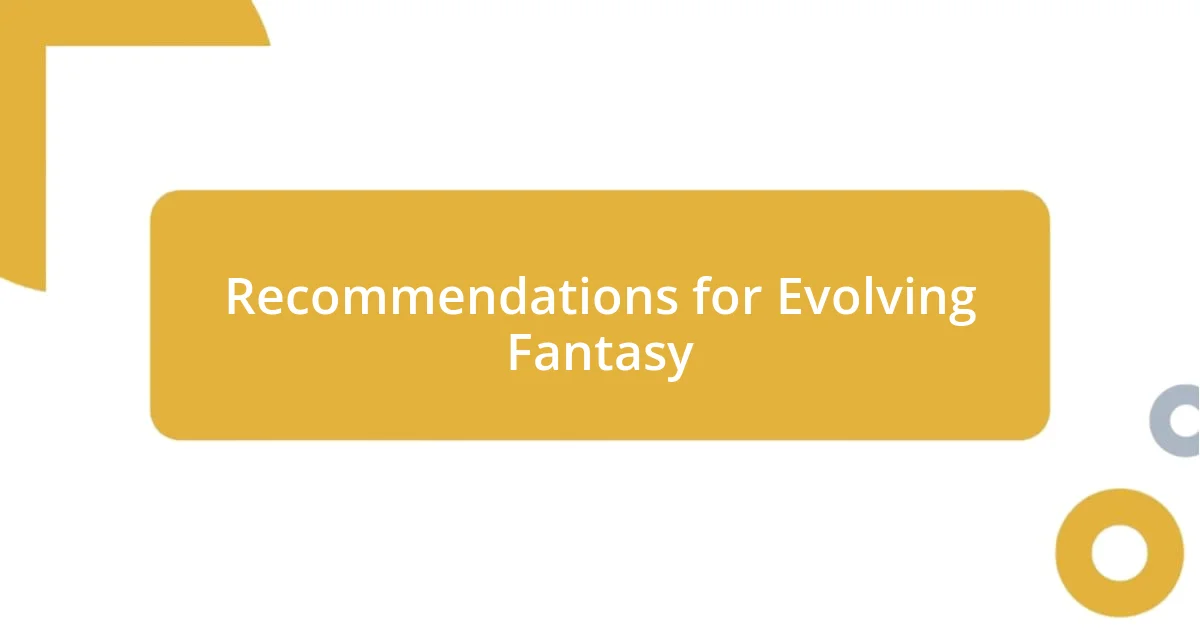
Recommendations for Evolving Fantasy
When diving into evolving fantasy, I often recommend giving works by Tamsyn Muir a chance, especially “Gideon the Ninth.” This book not only features a unique blend of necromancy and science fiction, but it also challenges traditional gender roles and expectations in fantastical settings. I remember feeling a thrill of excitement as I navigated the complex relationships and the gritty, dark humor. Have you felt that rush when reading something that defies conventions?
Another standout in the evolving fantasy genre is “A Song of Wraiths and Ruin” by Roseanne A. Brown. This novel intertwines African mythology with vibrant world-building, showcasing a richly diverse tapestry of characters as they face their inner fears. I was captivated by the depth of the characters and their struggles, reflecting how real-life cultural narratives can be embraced and celebrated. Do you think stories like this could change how we view cultural heritage?
Collaborating with diverse voices is essential in fantasy literature today. I find that anthologies, like “A Phoenix First Must Burn,” allow for a breadth of perspectives. With each story, I felt the pulse of different cultures and experiences, making me think—what if every fantasy tale included such variety? This not only enriches the genre but truly evolves our understanding of what fantasy can be, offering fresh insights and fostering empathy within us all.
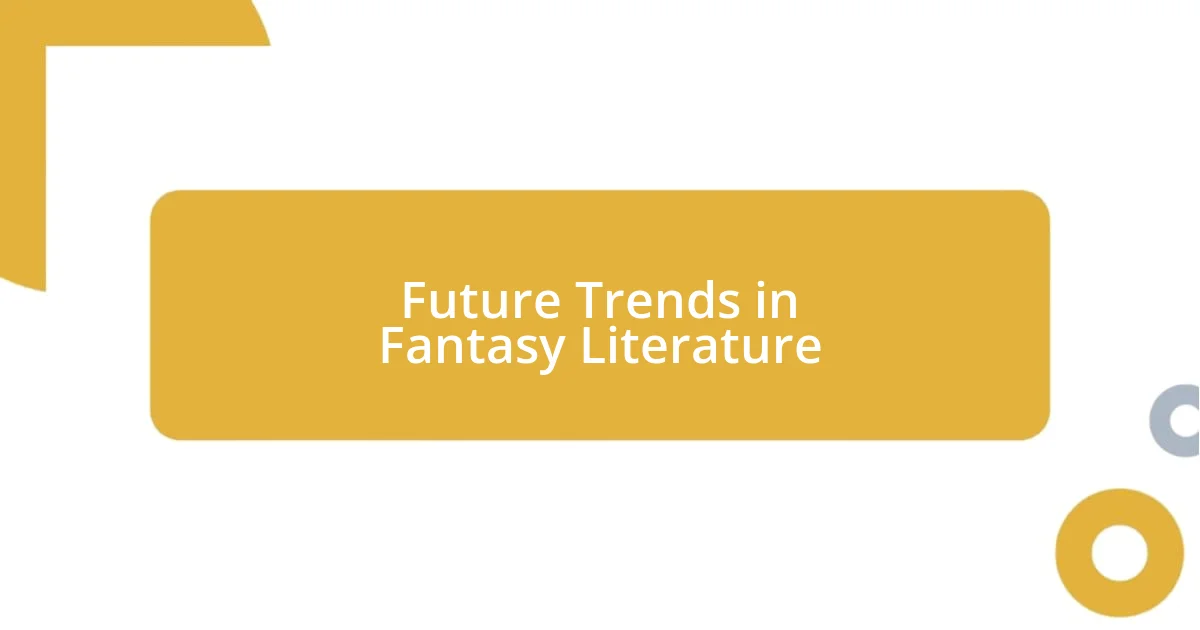
Future Trends in Fantasy Literature
As I look toward the future of fantasy literature, I can’t help but notice an increasing incorporation of technology. Authors are beginning to hybridize elements of fantasy with speculative technologies, creating worlds where magic coexists with advanced science. It’s fascinating to imagine characters who navigate both the mystical and the mechanical, sparking questions about the nature of reality and what it means to be human in a world that blurs those lines.
I also predict a stronger emphasis on mental health themes within fantasy narratives. Many authors now, like those of the “own voices” movement, are bravely tackling subjects like trauma, anxiety, and self-identity through their characters’ journeys. I once read a story where the protagonist’s struggle with anxiety was portrayed in such a relatable way; it made me feel seen. Isn’t it powerful when literature can reflect our innermost battles? This trend could foster deeper connections between readers and characters, making the fantastical feel more grounded and accessible.
Another exciting prospect is the rise of interactive storytelling formats. With technology advancing, I envision a future where readers have more agency in the narrative. Imagine choosing different paths for characters or influencing plot twists through a digital platform. Reflecting on my own experiences, I think of how much I enjoy being part of the story, rather than just a passive observer. Could this blend of reader engagement and fantasy create a new layer of immersion that enriches the reading experience? It’s a thrill to think about how these shifts will redefine our relationship with fantasy literature.


